Colloquium 2015, (Friday, April 8, 2016)
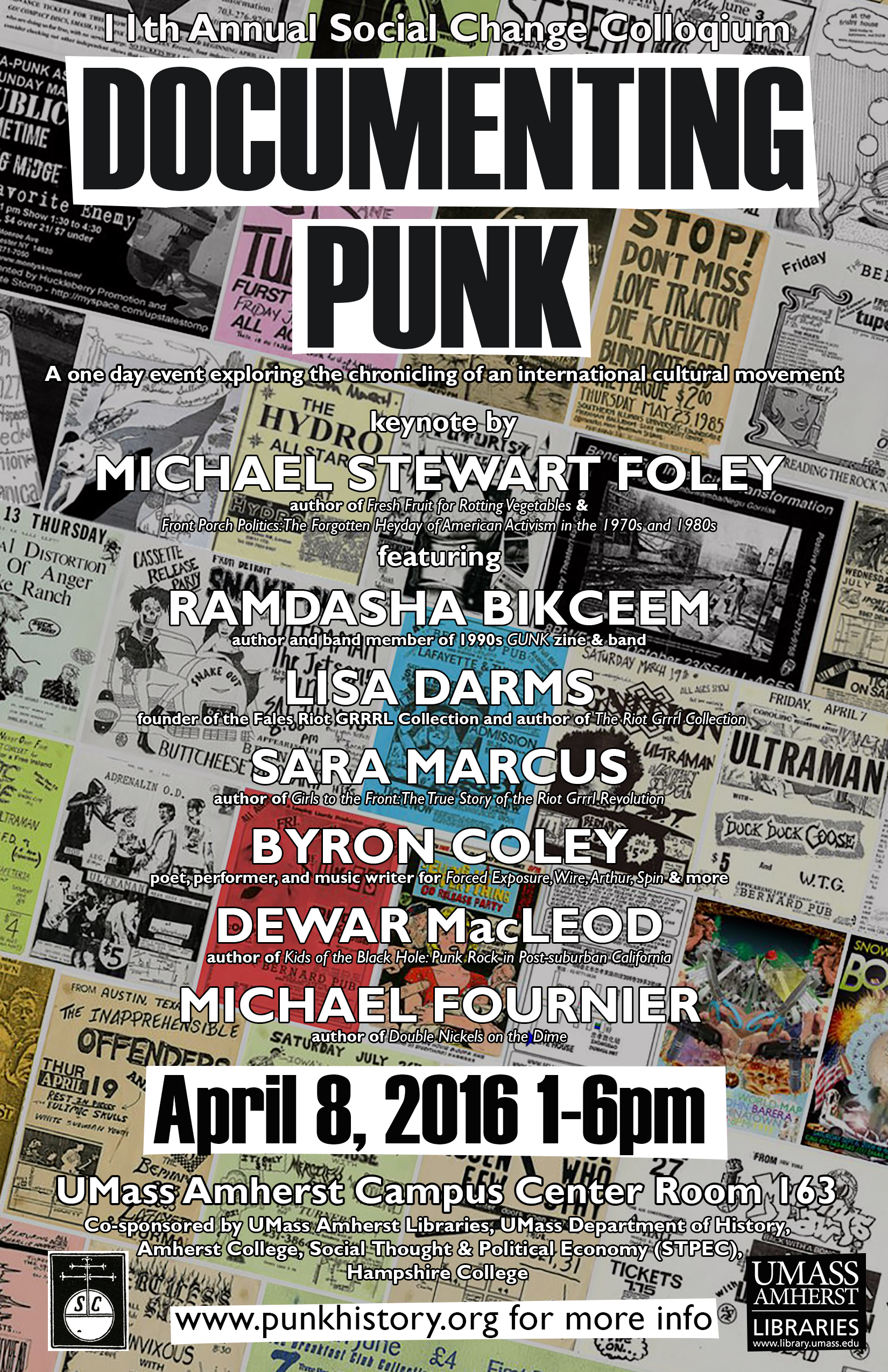
April 8, 2016, from 1:00 p.m. to 6:00 p.m., Room 163, UMass Campus Center
Punk, one of the last major youth sub-cultures during the pre-Internet era, was also a decentralized national and international community linked mostly by recordings, zines and the touring of bands. Individual scenes developed across the country in major urban areas, suburban communities and small towns. While each had its own personality and bands, they were linked by a shared distrust of establishment institutions and commercialized popular culture.
In recent years, punk archives have been established at academic repositories and as a result, scholars and the broader public have access to stories that have before only been shared within the punk community. Efforts have also been made to chronicle the history of the movement through the making of films, books and oral histories. The colloquium aims to open a conversation about the documentation of punk. The panel will explore questions including: How can the anti-establishment, anti-institutional, do-it-yourself ethos of punk be reconciled with the desire to collect, preserve and academically study the movement? How can the needs of community access be balanced with the demands of proper conservation? Can the ways scholars, archivists and librarians document a community be reconciled with the ways the movement documents itself?
Keynote speaker Dr. Michael Stewart Foley is the author of Fresh Fruit for Rotting Vegetables and Front Porch Politics, The Forgotten Heyday of American Activism in the 1970s and 1980s. Foley is a professor of American Political Culture and Political Theory at the University of Groningen in the Netherlands. He is also a founding editor of The Sixties: A Journal of History, Politics, and Culture.
Event speakers also include Ramdasha Bikceem, Byron Coley, Lisa Darms, Michael T. Fournier, Deward MacLeod, Sara Marcus and Tanya Pearson. For full speaker bios, visit: www.punkhistory.org.
The colloquium is free and open to the public. RSVP at: http://bit.ly/punksignup The event is co-sponsored by the UMass Amherst Libraries, UMass Amherst Department of History, Amherst College, Hampshire College, and Social Thought & Political Economy (STPEC).
Colloquium 2014, Tenth Anniversary (Monday, November 3rd)
November 3, 2014, from 4:00 p.m. to 5:30 p.m., Lower Level, W.E.B. Du Bois Library
“A Long and Winding Road: The legacy of the back-to-the-land communes of the 1960s,” will explore the nearly forty year history of some of the region’s best known communes: Montague Farm and Wendell Farms nearby in Massachusetts, and Packer Corners and Tree Frog Farms in neighboring southern Vermont. All were partners in the back-to-the-land movement of the late 1960s and early 1970s; all have survived into the current era. The colloquium’s four speakers, who have each spent much of the intervening years on or near one of the four farms, represent each of these idealistic enterprises, as well as offering their own specific views. What have they learned from their long years in service to their ideals? Was the altruism of the counterculture era borne out in the experiences they faced later? Would they recommend the route of alternative life to the youth and radicals of today?
The sources of inspiration that led to the creation of these communities and the evidence of their later influence are documented by SCUA. The Famous Long Ago archive was formed to collect, preserve, and make available materials relating to the communes at Montague Farm, Packer Corners, Johnson Pasture, Wendell Farm, and Tree Frog Farm. Collections range from from the papers of writers Steve Diamond, Raymond Mungo, and Jonathan Maslow to those of anti-war activists Randy Kehler and Betsy Corner; from the records of the Liberation News Service, the organization that spawned the farms, to the Alternative Energy Coalition, and Musicians United for Safe Energy, later enterprises of the region’s communal farmer-activists. It also includes the photographic collections of farm parent Roy Finestone, photojournalist Lionel Delevingne, and former head of a neighboring Montague ashram, Stephen Josephs.
Panel:
Daniel Keller, filmmaker, farmer: Wendell Farm, Green Mountain Post Films
Verandah Porche, writer, teacher: Packer Corners Farm, Monteverdi Artists Collaborative
John Scagliotti, filmmaker, LGBT activist: Tree Frog Farm, Kopkind Colony
Susan Mareneck, artist, teacher, social worker: Early resident and longtime neighbor of Montague Farm, Montague Catholic Social Ministries
Moderator:
Timothy Miller, University of Kansas, scholar of intentional communities, author of The Hippies and American Values (1991), The Quest for Utopia in Twentieth-Century America (1998), The Sixties Communes: Hippies and Beyond (1999)
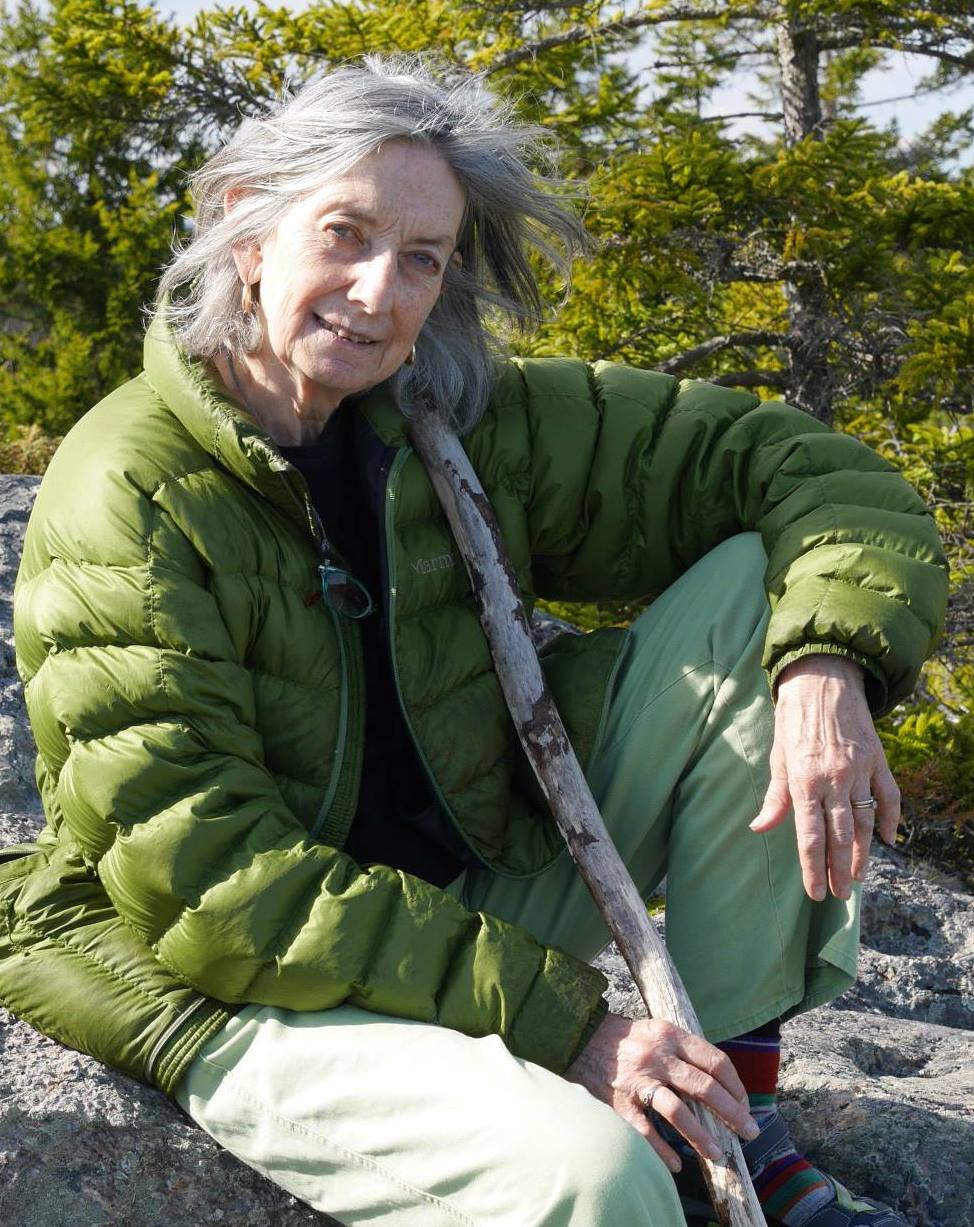
Verandah Porche, a forty-year resident of Packer Corners Farm (known to the reading public, through the works of Ray Mungo and others, as Total Loss Farm) works as a poet-in-residence, performer, and writing partner. Based in rural Vermont since 1968, she has published three volumes of poetry – Sudden Eden (Verdant Books), The Body’s Symmetry (Harper and Row) and Glancing Off (See Through Books) – and has pursued an alternative literary career, creating collaborative writing projects in nontraditional settings: literacy and crisis centers, hospitals, factories, nursing homes, senior centers, a 200 year-old Vermont tavern, and an urban working class neighborhood. Broad Brook Anthology, a play for voices, honors the lives of elders in her home town of Guilford, Vermont. Listening Out Loud documents her residency with Real Art Ways in Hartford, Connecticut. Come Over is a CD of songs written with her neighbor Patty Carpenter, performed by the Dysfunctional Family Jazz band. She has read her work on NPR stations, in the Vermont State House, and at the Guggenheim Museum. In 1998 the Vermont Arts Council presented her with its Award of Merit, and Marlboro College, in 2012, an honorary Doctor of Humane Letters.
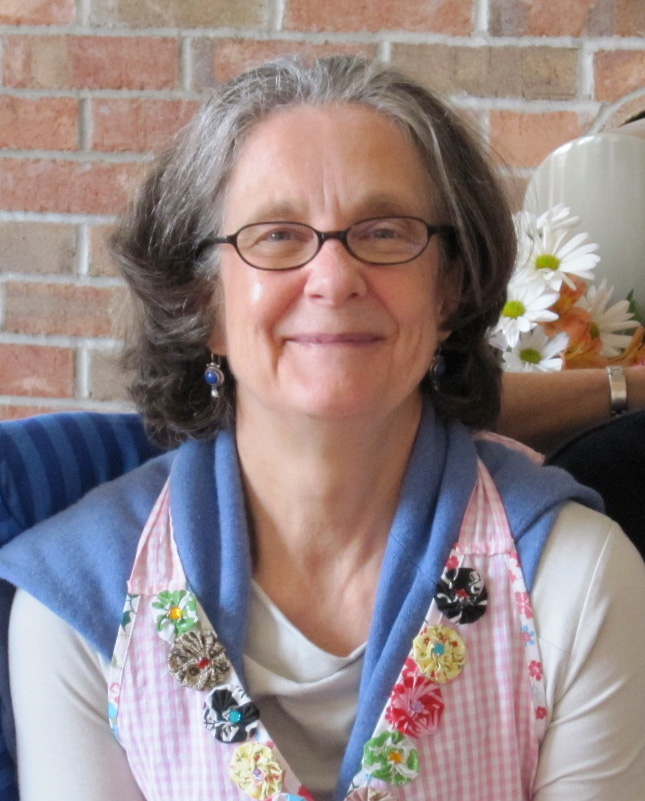
Susan Mareneck arrived in the Pioneer Valley in the mid 1960s, and spent her college years engaged in civil rights and anti-war activities, majoring Art and Political Science. After experiencing Montague Farm for several months in its early days, she settled into an unrenovated 18th century farmhouse in nearby Leverett, a building without heat or running water. Improving it slowly but concertedly over the years, she returned regularly to the house for vacations and summers, and has remained a neighbor of Montague Farm and a member of its extended family ever since. Decamping after several years for a graduate degree in art, and finally a move to New York, she spent 30 years making art and teaching it at the Spence School and the Convent of the Sacred Heart, on New York’s upper east side, before returning to western Massachusetts in 2009 to work full time with families in Turners Falls as Executive Director at Montague Catholic Social Ministries. Living three blocks from Ground Zero, Susan saw her world change forever on 9/11. Her turn from education to social work reflects her long interest in non-profits and the role of faith in social change. Her work in that area has included projects directed toward employment, racism, educational policy, and prisons. She has exhibited, lectured, and published in the visual arts and historic preservation, and remains active in organizing the local history of her town, North Leverett, Mass.

John Scagliotti is an Emmy Award-winning American film director, producer, and radio broadcaster. He has received honors for his work on documentaries about LGBT issues including Before Stonewall and After Stonewall. During the 1970s, Scagliotti was the News and Public Affairs Director of the pioneering radio station WBCN-FM in Boston. For his work in radio, he was awarded two Major Armstrong Awards. In the early 1980s, he attended New York University Film School and went on to create In the Life for PBS, the first gay and lesbian national television series in the United States. The Scagliotti-produced documentary film Before Stonewall (1985) won the Audience Award at L.A. Outfest and two Emmies. Scagliotti directed a companion piece, After Stonewall, which won a Golden Eagle and the Audience Award at the Los Angeles Gay and Lesbian Film Festival. Scagliotti is openly gay. His partner for 24 years was the late, highly regarded journalist Andrew Kopkind. Together they produced the radio show The Lavender Hour. Scagliotti is a longtime resident of the Kopkind Colony, an activist community housed at Tree Frog Farm, a close neighbor to Packer Corners Farm in Guilford, Vermont. The Kopkind Colony holds an educational summer residency program for nonpartisan, independent journalists and community organizers. In addition, the Colony fosters public education through publication of its lectures and the hosting of open forums on contemporary issues held at Tree Frog Farm and in other educational centers around the country.
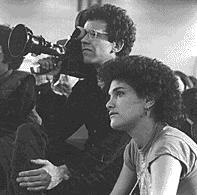
Daniel Keller, a founder of Wendell Farm, in Wendell Massachusetts, has lived there, keeping it a working organic farm, since its inception in 1969. In collaboration with Charles Light, a former communard of the Johnson Pasture and Montague Farm, Keller’s Green Mountain Post Films, with offices in nearby Turners Falls, has produced and distributed award-winning films for more than twenty-five years. GMP’s first documentary Lovejoy’s Nuclear War, released in 1975, about Montague Farm activist Sam Lovejoy, was one of the first films to question the nuclear energy policy of the United States. Since then GMP Films has continued to produce movies that explore social issues, Its films have been used as educational and organizational tools for activists working on peace, veteran, nuclear, environmental, and other related issues. GMP films include: The Last Resort (1978), and Save the Planet (1979), both on nuclear issues; The Secret Agent (1983), on Agent Orange; and Unknown Secrets (1990), on the reaction of artists and writers to the arrest, trial, and execution of accused spies Julius and Ethel Rosenberg. For Vietnam Experience Keller and Light teamed up with musician Country Joe McDonald to bring viewers closer to the reality of the Vietnam War. Cannabis Rising is an early investigation into the issues surrounding marijuana today so much in the news.
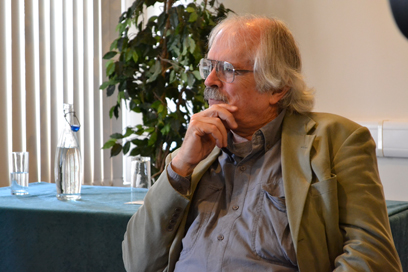
Timothy Miller is a longtime student of communal living, professor of religious studies at the University of Kansas, and author of The Hippies and American Values (1991), The Quest for Utopia in Twentieth-Century America (1998), The Sixties Communes: Hippies and Beyond (1999). His course offerings include a history of intentional communities in America; American religious history; and an overview of new and alternative religious movements in the United States. Miller’s major research focus is the history of intentional communities in America, especially in the twentieth century. For his work in this area, Professor Miller has been recognized by the Communal Studies Association as a distinguished scholar. Additional areas of research interest include American religious history, new and alternative religious movements in the United States, and religion in Kansas. Professor Miller also coordinates the Religion in Kansas Oral History Project. His most recent publications include The Encyclopedic Guide to American Intentional Communities (Richard Couper Press), Spiritual and Visionary Communities: Out to Save the World (Ashgate Publishing), as well as the second edition of The Hippies and American Values (University of Tennessee Press), and the second edition of Following In His Steps: A Biography of Charles M. Sheldon (University of Tennessee Press). Through Miller’s work on American communes, he has long been familiar with the extended farm family at the center of the current symposium. In a recent book review, taking in the larger field in which he is involved, he wrote, “…it can be safely said that Montague Farm has the best published record of any of the communes.”
Colloquium 2013 (Tue. March 5)
Author Tom Fels and media artist Mark Tribe will speak on Tuesday, March 5, 2013, from 4:00 p.m. to 6:00 p.m., in Room 2601 on Floor 26, of the Du Bois Library at UMass Amherst. The event, “Peace and War: Assessing the Legacies of Sixties Activism Today,” marks the completion of the eighth annual Social Change Colloquium.
Longtime independent writer and researcher Tom Fels’ new book Buying the Farm: Peace and War on a Sixties Commune (UMass Press, 2012) explores the long history of Montague Farm, north of Amherst, one of the era’s iconic experiments in social change. Before drawing his own conclusions about it in the book, he recounts the farm’s many early contributions to the counterculture, and later the farm’s devolution at the hands of competing farm-family factions, inviting us to question the balance between idealism and effectiveness. “For today’s young,” says Tom Hayden, author of The Long Sixties, “the economic future is far more bleak and global warming an unprecedented threat. Out of necessity, many will be searching for meaningful forms of communal self-sufficiency, healthful food, and renewable energy. Tom Fels’ captivating and profound reflection on one earlier commune, Montague Farm, founded in the 1960s, offers hard-learned reflections, some practical, some eternal, from a time when communes were the chosen path of many.” In the first hour of the colloquium Fels will read from Buying the Farm. There will be a question and answer period following the reading.
Mark Tribe is part of the next generation to be inspired by sixties activism. His Port Huron Project (2006-2009) is a series of reenactments of protest speeches from the New Left movements of the Vietnam era. Enacted at the site of the original event, each speech was delivered by an actor or performance artist. Videos of these performances have been screened on campuses, exhibited in art spaces, and distributed online as open-source media. As Julia Bryan-Wilson wrote in Artforum, in January 2008, “More than just recovering the past, these re-speaking projects use archival speeches to ask questions about the current place of stridency and forceful dissent, and the possibilities of effective, galvanizing political discourse.” In bringing the words of Cesar Chavez, Angela Davis, Stokely Carmichael, and others to the public through contemporary media, Tribe, in this portion of his work, creatively recycles earlier activism to relate it to issues of today. In the second hour of the colloquium, Tribe will show and discuss some of his work.
Colloquium 2012: Part I (Tue. Oct. 2)
Delevingne will discuss the mass media’s role in the nuclear power issue and his own responsibility before and after the Three Mile Island accident and Chernobyl disaster. Anna Gyorgy will discuss citizen action and democracy, with international examples based on her work with the Clamshell Alliance, and, more recently, with the strong German anti-nuclear/pro-solar movements.
New England was an epicenter of the antinuclear movement of the 1970s and 1980s. Sparked by the proposed construction of nuclear power plants in Montague, Massachusetts, and Seabrook, New Hampshire, a grass-roots movement blossomed in the region, drawing on a long tradition of non-violent political protest. Shortly after arriving in the United States from his native France in 1975, the photojournalist Lionel Delevingne began covering the antinuclear movement, including the history of civil disobedience and occupation at Seabrook, the aftermath of the Three Mile Island disaster, and other protests from New York to South Carolina and Europe.
Delevingne is the co-author of Drylands, a Rural American Saga (University of Nebraska Press, 2011); Northampton: Reflections on Paradise (Nouveau Monde Press, 1988); and Franco-American Viewpoints (Nouveau Monde Press/Wistariahurst Museum, 1988). His work has been exhibited frequently in the U.S. and abroad and published widely in the mainstream and alternative press, including the New York Times, Newsweek, Mother Jones, Vanity Fair, Le Figaro Magazine, and Die Zeit. Delevingne has participated in many award-winning projects sponsored by National Endowment of the Arts/Humanities (NEA), Massachusetts Endowment for the Humanities, University & College Designers Association (UCDA), University Professional & Continuing Education Association (UPCEA), and Council for Advancement and Support of Education (CASE).
Anna Gyorgy was active in the early movement against nuclear power, and is the author-editor of the classic work NO NUKES: Everyone’s Guide to Nuclear Power (South End Press, 1979/1981). She is in the process of returning to the U.S. after 25 years abroad, where she has since 1999 coordinated the multi-lingual website project: “Women and Life on Earth” (www.wloe.org).
The related exhibit “To the Village Square” includes some of the movement’s most memorable images, shot by Delevingne, along with materials drawn from the rich anti-nuclear collections held in the UMass Amherst Libraries’ Department of Special Collections and University Archives.
Colloquium 2011
Why These Stories Need to be Told in their Variety, their Intensity and their Honesty” (Nov. 10)
Social justice activist Tom Weiner will give a talk on his recently published book Called to Serve: Stories of Men and Women Confronted by the Vietnam War Draft. The book is the fruit of years of extensive interviews with chapters for people who made different choices among the available options: to serve, to resist, to leave the country, to become a conscientious objector, or to find a way around the draft altogether as well as a chapter for those who loved, counseled and supported. His presentation will include several of his interview subjects who will share parts of their testimonies. Weiner recently donated the tapes of the interviews and the transcripts to Special Collections and University Archives.
Colloquium 2010: Part I (Fri. Oct. 1, 1.30 pm)
On Friday, October 1, Steve Lerner will talk about his new book Sacrifice Zones: The Front Lines of Toxic Chemical Exposure in the United States. The event will be held from 1.30-3pm in the Gordon Hall, 418 N. Pleasant Street, Amherst.
Across the United States, thousands of people, most of them in low-income or minority communities, live next to heavily polluting industrial sites. Many of them reach a point at which they say “Enough is enough.” In Sacrifice Zones, published by MIT Press in 2010, Steve Lerner tells the stories of twelve communities, from Brooklyn to Pensacola, that rose up to fight the industries and military bases causing disproportionately high levels of chemical pollution.
Steve Lerner is research director of Commonweal and the author of Eco-Pioneers: Practical Visionaries Solving Today’s Environmental Problems.
This event is co-sponsored by the Political Economy Research Institute’s Environmental Working Group and Special Collections & University Archives
Colloquium 2010: Part II (Thurs. Oct. 28, 6pm)
On Thurs. October 28, Amy Bass will talk on “Whose Broad Stripes and Bright Stars? The 1968 Olympics and the Creation of the Black Athlete,” in Room 803, Campus Center, UMass Amherst. The event is co-sponsored by the Feinberg Family Lecture Series organized by the UMass Amherst Department of History, and is free and open to the public.
Amy Bass is professor of history at the College of New Rochelle. She is the author of Not the Triumph But the Struggle: 1968 Olympics and the Making of the Black Athlete and Those About Him Remained Silent: The Battle over W. E. B. Du Bois. She is the editor of In the Game: Race, Identity, and Sports in the Twentieth Century. Bass has an M.A. and a Ph.D. in history from Stony Brook University. Her research interests include African American history, modern American culture, identity politics, and historical theory and methodology. She has served as research supervisor for the NBC Olympic unit at the Atlanta, Sydney, Salt Lake, Athens, and Torino Olympic Games.
Dr. Bass’s talk will explore the black power protest at the Mexico City Olympic Games by Americans Tommie Smith and John Carlos in 1968. Their moment on the victory dais effectively linked American sports and racial politics in the U.S. She will examine how the black power protest in Mexico became the defining image of the 1968 Olympics. She will also explore how the Olympic Project for Human Rights mobilized black athletes to assume a new set of responsibilities alongside their athletic prowess, forcing Americans, and the world, to reconsider the role of sports within civil rights movements.
2009 (Oct. 29): A Conversation

- Raymond Mungo
- Raymond Mungo was a key figure in the literary world of the late 1960s counterculture. A founder of the Liberation News Service — an alternative press agency that distributed news reflecting a left-oriented, antiwar, countercultural perspective — Mungo moved to Vermont during the summer of 1968 and settled on a commune. A novelist and writer, his first book, Famous Long Ago: My Life and Hard Times With Liberation News Service (1970) is considered a classic account of the countercultural left, and his follow-up Total Loss Farm (1971), based on his experiences on the Packer Corners commune, was nominated for the Pulitzer Prize. Mungo has written several novels, screenplays, dozens of essays, and hundreds of newspaper and magazine articles during a literary career of more than four decades. For the past ten years, he has worked as a social worker in Los Angeles, tending primarily to AIDS patients and the severely mentally ill.
- Todd Gitlin
- While a college student in the early 1960s, Todd Gitlin rose to national prominence as a writer and theorist of the New Left. A president of Students for a Democratic Society in 1963-1964, he was a central figure in the civil rights and antiwar movements, helping to organize the first national mobilization against the war in Vietnam, the March on Washington of 1965. After receiving degrees from the University of Michigan and the University of California Berkeley, Gitlin joined the faculty at Columbia University, where he is currently Professor of Journalism and Sociology and Chair of the doctoral program in Communications. Over the past thirty years, he has written extensively on mass communication, the media, and journalism. The author of twelve books, Gitlin is today a noted public intellectual and prominent critic of both the left and right in American politics, arguing that pragmatic coalition building should replace ideological purity and criticizing the willingness of those on both sides to use violence to reach ends to power.
Talk II:
- Thurs, Oct. 29, 2009, 4 p.m., span class=”bold”>Blake Slonecker
- Assistant Professor of History at Waldorf College, will present a talk, “Living the Moment: Liberation News Service, Montague Farm, and the New Left, 1967-1981.
2008 (Oct. 30): Then and Now: Sixties Activism and New Realities
- Junius Williams
- Writer and activist.
- Parker Donham
- Journalist and former press secretary for Eugene McCarthy
2007 (Oct. 30): Fifty Years of Radical Activism: An Evening with Tom Hayden
- Tom Hayden
- Fmr President of Students for a Democratic Society
- For nearly fifty years, Tom Hayden’s name has been synonymous with social change. As a founding member of the Students for a Democratic Society in 1961, he was author of its visionary call, the Port Huron Statement, the touchstone for a generation of activists. As a Freedom Rider in the Deep South in the early 1960s, he was arrested and beaten in rural Georgia and Mississippi. As a community organizer in Newark’s inner city in 1964, he was part of an effort to create a national poor people’s campaign for jobs and empowerment.
- When the Vietnam War invaded American lives, Hayden became a prominent voice in opposition, organizing teach-ins and demonstrations, writing, and making one of the first trips to Hanoi in 1965 to meet with the other side. One of the leaders of the street demonstrations against the war at the 1968 Chicago Democratic Convention, he was one of eight organizers indicted — and eventually acquitted — on charges of conspiracy and incitement.
- After the political system opened in the 1970s, Hayden organized the grass-roots Campaign for Economic Democracy in California, which won dozens of local offices and shut down a nuclear power plant through a referendum for the first time. He was elected to the California state assembly in 1982, and the state senate ten years later, serving eighteen years in all, and he has twice served on the national platform committee of the Democratic Party.
2007 (Oct. 30): The Sixties: The Way We Really Were
- Johnny Flynn, Tim Koster, Sheila Lennon, Karen Smith
- As part of its annual Colloquium on Social Change, the Department of Special Collections and University Archives of UMass Amherst presents a panel discussion and readings from a new book, Time it Was: American Stories from the Sixties, a set of short memoirs written by people who participated in a wide variety of Sixties-era movements and events. Join us for speakers Johnny Flynn (American Indian Movement), Sheila Lennon (Woodstock), Tim Koster (Draft Lottery “Winner” and Conscientious Objector), and Karen Manners Smith, who spent five years in a religious cult.
- For students, the readings and discussion provide an opportunity to hear stories that move beyond Sixties mythology towards an appreciation of the real — but no less exciting — experiences of young people in that tumultuous era. Non-students and members of the Five College and surrounding communities will find this panel discussion a chance to reconnect with their own memories of the period.
2006: Building the Left in the Age of the Right: Developing a Lifetime Commitment
- Eric Mann and Lian Hurst Mann
- Labor/Community Strategy Center, Los Angeles
- Flier announcing the event (pdf)
2005: Crossroads: A Colloquium on Social Change
- Carl Oglesby
- Writer, antiwar activist, former President of SDS
- Tom Fels
- Curator, writer, fmr resident of Montague Farm Commune
- Catherine Blinder
- Activist, writer, fmr resident of Tree Frog Farm Commune
- Flier announcing the event (pdf)



